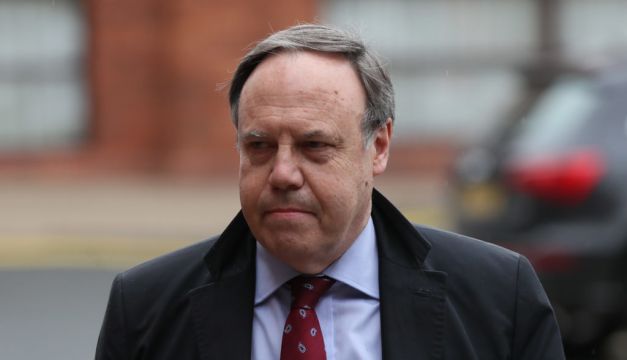Many unionists remain deeply worried about the operation of a border in the Irish Sea despite the deal agreed with the British government, a former deputy leader of the DUP has warned.
Nigel Dodds said many unionists were also worried about the continued application of EU law in the North, signalling tensions within the party over the efforts to revive Stormont.
The House of Lords in London heard from the DUP peer as the House of Commons approved fast-tracked legislation aimed at addressing concerns about post-Brexit trade arrangements in Northern Ireland, which have led to a two-year DUP boycott of devolved government.
The DUP’s leader, Jeffrey Donaldson, has said the changes would restore Northern Ireland’s place in the UK single market.
But Mr Dodds suggested there was a divergence of views within the party, telling peers: “Will he accept, and your lordships in this House need to realise, that there are still many unionists who are deeply worried and concerned that the Irish Sea border… still exists, since many goods coming from Great Britain, British goods coming to Northern Ireland, especially in manufacturing, still need to go through full EU compliance checks, procedures.
“Whilst we have the new green lane which is mainly for retail, the default position is, as I’ve described, for everything else that doesn’t have an end point for sale in Northern Ireland.
“Will he also confirm the concern that there is among many unionists – and he knows Northern Ireland very well – at the continued sovereignty, jurisdiction and application of EU laws over large swathes of our economy in 300 areas, to which the Stormont brake doesn’t apply and we cannot make or amend laws within those areas.
“These are fundamentally important constitutional and economic issues and many unionists still are concerned about these issues.”
Mr Dodds also argued that “the fundamentals” of the Windsor Framework remained in place despite the planned changes.
Northern Ireland Office minister Jonathan Caine said the British government did not recognise there was “anything like a trade border” in the Irish Sea.
He said: “I am sorry to say to him that the government does take a very different view as a result of the deal that has been agreed over the past few days, as indeed I should gently point out does his party leader, who along with the government now accepts that what we have agreed is a firm basis for going back into the institutions and re-establishing the executive and the Assembly at Stormont.
“We simply don’t recognise that what he describes is anything like a trade border between Great Britain and Northern Ireland. As a result of this deal the number of goods that will pass through into Northern Ireland without checks will be significantly increased.”







